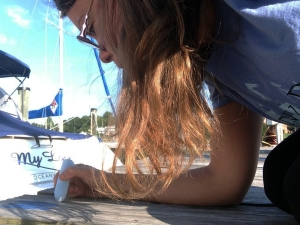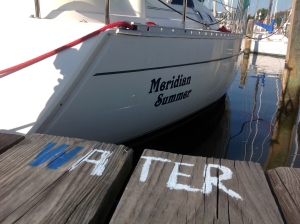Chapter 3 is about to close and I have to admit, I am a little relieved. Andy and Kermit were right! It really isn’t easy being green. Being asked to chart my every move, every dollar and watching how my decisions impact both my immediate physical environment and the greater eco-system has been eye-opening and quite frankly upsetting. I had always considered myself someone who cared about the environment and thought my habits were not so harmful but I now realize, after monitoring my actions, just how hypocritical and inconsistent I can be. I purchase local meat, veggies and fruit but also buy wine from Spain and Italy, avocados from Peru and clothes made in Cambodia. I’ll save energy by choosing the lifestyle of living on a boat but don’t choose the lifestyle in which I don’t need a car to go to work. I’ll compost my food product waste but will waste gas driving to a place that I can dispose of my compost. Trying to make positive choices has not been a simple process.
But alas this month ends, and I am free of this personal eco-awareness experiment. I no longer have to count each mile I drive, how many minutes my showers run, and how many times I flush a toilet. I no longer will track all this information in a publicly viewed spreadsheet nor am I accountable to my Living Chapter writer Andy. Phew, I made it through! But really, am I free of the consequences of my choices because this part of my project is over? Aren’t we all accountable to each other when faced with these environmental issues? Is this not something we are all going to have to deal with together at some point? Unfortunately we cannot all be free from the outcomes of the choices we make at the end of this month. The real implications of our habits and decisions have a much greater impact than winning or losing Andy’s Cap and Trade game.
So even as the month ends, I am still struggling with a lot of difficult questions that were raised over the past four weeks. How do we convince our society to make changes as a whole? Can we separate our environmental issues from our social justice and economic class divide issues? How do we change our educational structure to include environmental practices…umm I could go on.
So I may not have answers to any of these bigger questions but the good news is this: I have learned some things about myself this month.
On the practical side: I can actually do a lot myself to make a difference. And in the simple altering of my daily habits I actually realized that these changes were really not that difficult and have been good for me personally along with being better for the environment. When I save energy/water I am saving money. When I am eating organic and local foods, I am eating healthier. There are a ton of easy and practical tools and ideas for everyday folks to learn how to make better choices for ourselves and more efficient choices with our resources.
On the philosophical side: I gained a lot of insights writing and enacting my “opinion pieces”. Reflecting on what I care about most and engaging strangers in dialogue about their concerns and ideas, brought me much closer to pin-pointing and understanding what my own role could be in helping to better our environment.
I realized that my greatest advocacy tool is my ability to listen. Through listening and community engagement I can make a much larger impact by bringing new voices and greater awareness to any issue than by just sharing my own voice alone. Any change starts with one person caring about something and making conscious choices to do something about it. My hope is that engaging people to examine themselves, their motives, and their environments more closely will make them want to advocate and protect the things they care about. I think that if we don’t start spending time finding out what others care about and are motivated by we may never motivate enough people to join the collaborative efforts we need to move forward. So I will continue to ask of others opinions!
In my public opinion piece, I asked a stranger on the street to share with me what he thought the best solution was for engaging people in environmental advocacy issues. He responded with this quote.
“An affordable solution to environmental problems is mindful awareness.”
This left a lasting impression on me. I agree entirely and feel that our own mindfulness really is the first place in which we can start working on this issue. I think we all could afford to become a bit more mindful in general (and especially concerning our environment). Let’s start as individuals and model our practices and habits as a community.
I want to thank Andy for pushing me to become more intentional and mindful in my own actions this month as well as asking me to reflect upon my own opinions and what I care about.
8/31/13
Just finding this blog today? Read more about the Living Chapters project here.
Like the Living Chapters Facebook page for detailed blog updates




















































